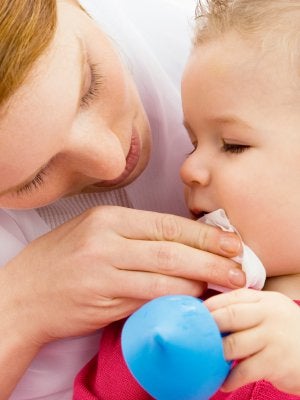CRYING AND COLIC

We believe breast milk is the best food for infants. When in consultation with their healthcare professional, mothers and families find that optimal breastfeeding is not possible due to their infant’s medical condition, formulas for special medical purposes play a vital role in providing essential nutrients to infants. We have a global commitment to market breast-milk substitutes responsibly.
Crying is a normal part of development for babies and is the main way that they communicate when they are hungry, angry, in pain or even bored. It is normal for a baby to cry for around two hours each day, but this shouldn’t last beyond six weeks of age.
Colic describes unexplained crying and predictable periods of distress in an otherwise healthy and well-fed baby. It is usually short-lived and starts when a baby is a few weeks old. In most cases, baby colic will have resolved by five months.
- Curled up legs, clenched fists and tensed abdominal muscles are typical colic symptoms
- Baby colic generally follows a pattern of three
Why does my baby have colic?
The medical community still don’t know why some babies develop colic and others do not.
Here are some possible causes of your baby’s colic symptoms:

three hours per day
three days per week,
three weeks
- Food allergies, such as a Cow’s Milk Protein Allergy (CMPA)
- A digestive system which hasn’t fully developed
- An injury or an infection
This will allow you to select all the symptoms that your baby may have that can be cow’s milk-related. You can then discuss these with your doctor.
In any case, if you have any doubts or concerns about your baby’s health, you should always seek advice from a medical professional as soon as possible.
OTHER SYMPTOMS OF COW'S MILK PROTEIN ALLERGY
IMPORTANT NOTICE: Mothers should be encouraged to continue breastfeeding even when their babies have cow’s milk protein allergy. This usually requires qualified dietary counseling to completely exclude all sources of cow’s milk protein from the mothers’ diet.If a decision to use a special formula intended for infants is taken, it is important to follow the instructions on the label. Unboiled water, unboiled bottles or incorrect dilution can make babies ill. Incorrect storage, handling, preparation and feeding can eventually lead to adverse effects on the health of babies.Formula for special medical purposes intended for infants must be used under medical supervision.















